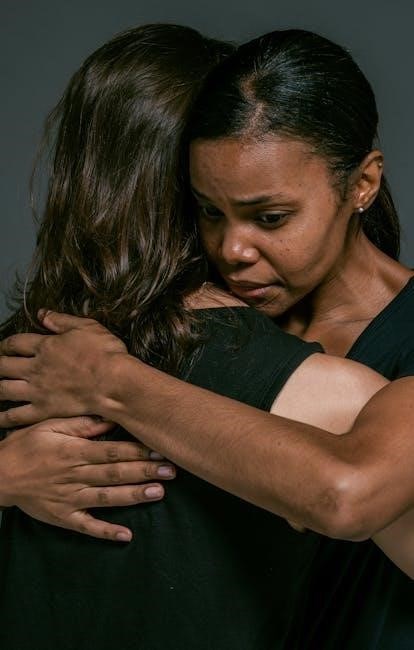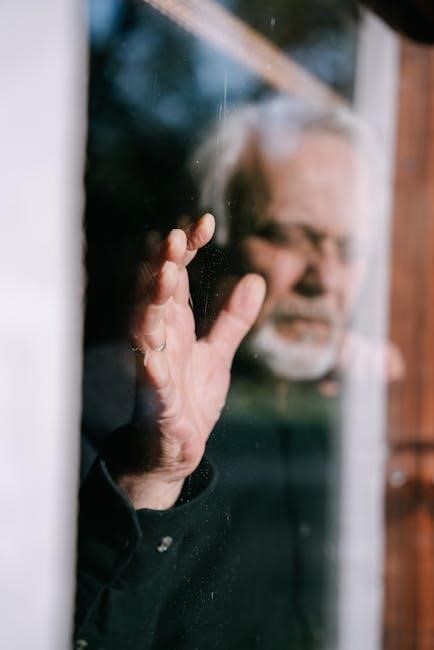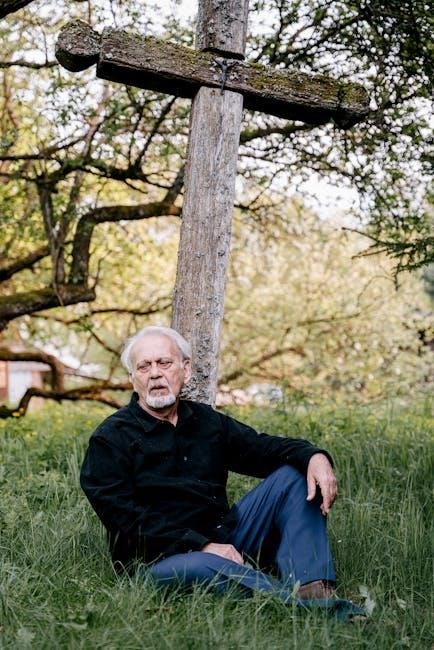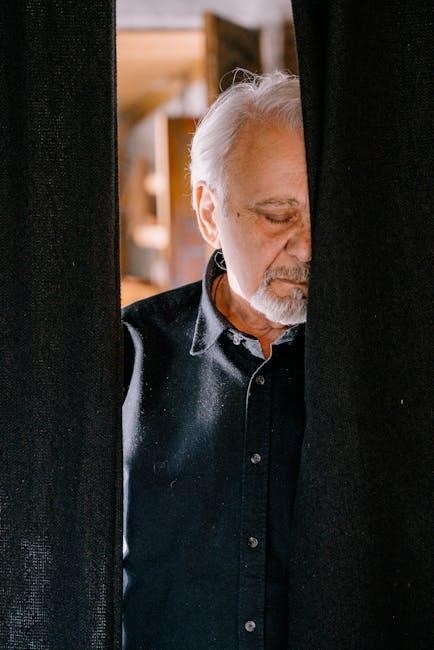The holiday season can be bittersweet for those grieving, intensifying feelings of loss․ Navigating traditions and emotions can be challenging yet meaningful for many․
Understanding the Challenge of Grief During the Holidays
The holiday season often amplifies feelings of loss, as traditions and memories remind us of loved ones no longer present․ Grief can feel overwhelming during this time, as joyous celebrations contrast with personal sadness․ The pressure to participate in festive activities may intensify emotional pain, making it essential to acknowledge and validate these feelings․ Each person’s experience with grief is unique, shaped by personal circumstances and relationships, requiring self-compassion and patience during this challenging period․

Understanding Grief During the Holidays
During the holidays, emotions often intensify, making grief feel more pronounced․ Each person’s experience is unique, shaped by their relationship, coping strategies, and surrounding environment․
How Holidays Can Intensify Feelings of Loss
Holidays often amplify grief due to cherished memories and nostalgia․ The absence of a loved one can feel more pronounced, intensifying emotional pain․ Social gatherings and festive traditions may remind you of what’s missing, while the pressure to celebrate can clash with your sorrow․ Disrupted routines and the expectation of joy can also heighten feelings of loss, making it harder to navigate this sensitive time․
The Emotional Turbulence of Grief During Festive Times
Grief during the holidays can feel overwhelming, as emotions like sadness, anger, and nostalgia surface․ The contrast between festive cheer and personal sorrow creates turbulence․ Social pressures to celebrate may clash with the need to grieve, leading to feelings of isolation․ Even joyful moments can trigger painful memories, making emotional stability difficult․ Acknowledging these feelings without judgment is crucial for navigating this complex time․

Planning Ahead for the Holidays
Planning ahead helps minimize stress and create space for comfort․ Decide how to spend your time, scale back activities, and set boundaries to honor your needs and loved ones․
Tips for Scaling Back on Activities
Scaling back on holiday activities can help reduce stress and allow space for healing․ Simplify traditions, set realistic limits, and prioritize what brings comfort․ It’s okay to say no to events or tasks that feel overwhelming․ Consider delegating responsibilities or involving others in decision-making․ Focus on what feels meaningful, and let go of obligations that don’t align with your current needs․ This approach fosters self-care and creates room for cherished memories while honoring your loved one․
Redefining Holiday Traditions
Redefining holiday traditions can help you navigate grief while maintaining meaningful connections; Consider adapting rituals to include memories of your loved one, such as lighting a candle or creating a memory box․ Involve family and friends in the process to create new, comforting practices․ This approach honors their legacy while allowing you to find joy in new ways of celebrating․ It’s a step toward healing that keeps their memory close․
Creating Meaningful Rituals
Creating meaningful rituals, like lighting a candle or building a memory box, can bring comfort and honor your loved one during the holidays․
Memory Rituals to Honor Loved Ones
Memory rituals, such as lighting a candle or creating a memory box, provide comfort and help honor loved ones during the holidays․ These acts allow you to acknowledge their presence in your life while navigating grief․ They serve as meaningful ways to keep their memory alive and can bring a sense of peace during a challenging time․
Lighting a Candle or Creating a Memory Box
Lighting a candle or creating a memory box can be powerful rituals to honor loved ones during the holidays․ A candle symbolizes the enduring light of their presence, while a memory box holds cherished items that remind you of them․ These acts offer comfort and a way to acknowledge their absence while keeping their memory close․ They provide a meaningful way to process grief and find solace in their enduring legacy․
Seeking Support
Seeking support from loved ones, support groups, or professionals can provide comfort and relief․ Connecting with others who understand your grief helps navigate the emotional challenges of the season․
Talking to Trusted Friends or Family
Talking to trusted friends or family can provide emotional relief and help you feel supported during the holidays․ Openly sharing your feelings with loved ones who understand your loss can foster a sense of connection and reduce isolation․ Expressing your grief aloud can be therapeutic, allowing you to process emotions and find comfort in shared memories of your loved one․
Joining a Grief Support Group
Joining a grief support group can provide a sense of community and understanding during the holidays․ Sharing experiences with others who are grieving can reduce feelings of isolation․ These groups offer a safe space to express emotions, share memories, and learn coping strategies․ Hearing others’ stories can validate your feelings and provide comfort, helping you feel less alone in your journey․ Support groups can also offer practical advice and emotional support tailored to your needs during this challenging time․

Self-Care During the Holidays
Prioritize your well-being by pacing yourself, setting boundaries, and engaging in comforting activities that bring solace and peace during this emotional time․
Pacing Yourself and Setting Boundaries
Allow yourself to step back and prioritize rest․ It’s essential to set realistic limits and say no to overwhelming activities․ This helps maintain emotional balance and prevents burnout, fostering a healthier approach to navigating the holidays while grieving․
Engaging in Comforting Activities
Engage in activities that bring comfort, such as prayer, breathing exercises, or journaling․ These practices can help ground you and provide emotional relief․ Whether it’s lighting a candle, reflecting on memories, or simply taking quiet moments for yourself, these acts can offer solace and reduce feelings of loneliness during the holidays․ Remember, there’s no right or wrong way to find comfort—focus on what feels most nurturing for you․

Honoring Your Loved One
Honoring your loved one during the holidays can bring comfort․ Consider lighting a candle, creating a memory box, or incorporating their favorite traditions to celebrate their life and legacy․
Creating a Memorial or Legacy Project
Creating a memorial or legacy project can be a meaningful way to honor your loved one․ Consider building a memory box, planting a tree, or donating to a charity in their name․ These acts allow you to celebrate their life while finding comfort in the knowledge that their legacy lives on․ Such projects provide a sense of purpose and help keep their memory close during the holidays and beyond․
Incorporating Their Favorite Traditions
Incorporating your loved one’s favorite traditions can bring comfort and closeness during the holidays․ Whether it’s cooking their favorite dish, playing their cherished music, or revisiting a special activity, these moments honor their memory․ This practice allows you to feel their presence while creating new ways to celebrate their life․ It’s a meaningful way to keep their spirit alive and woven into your holiday experiences․

Navigating Social Situations
Navigating social situations during the holidays while grieving can be challenging․ Setting boundaries, being honest about your needs, and prioritizing comfort helps ease emotional stress․
How to Handle Holiday Gatherings
Holiday gatherings can be overwhelming while grieving․ It’s essential to communicate your boundaries with loved ones beforehand․ Allow yourself to step away if needed and engage in activities that bring comfort․ Prioritize self-care by setting realistic expectations․ Remember, it’s okay to say no to events that feel too burdensome․ By being honest about your needs, you can navigate these situations with grace and emotional balance․
Setting Boundaries with Others
Setting boundaries during the holidays is crucial for emotional well-being․ Communicate your needs clearly with family and friends, allowing yourself to step back if overwhelmed․ It’s okay to decline invitations or limit participation in activities․ Be honest about what feels manageable and what doesn’t․ By prioritizing your comfort and energy, you honor your grief journey and protect your mental health during this sensitive time․

Involving Children in the Process
Involve children in discussions about holiday plans, allowing them to express feelings and choices․ This helps them feel in control and supported during a difficult time․
Discussing Holiday Plans with Children
Openly discussing holiday plans with children helps them understand their feelings and options․ Encourage them to share their thoughts and involve them in decisions, such as new traditions or simplified activities․ This fosters a sense of control and comfort, allowing them to process grief while feeling supported; Be honest about changes and validate their emotions, ensuring they feel heard and included in the process․
Helping Them Feel in Control
Allow children to make small decisions, such as choosing activities or traditions, to foster a sense of control․ Offer choices within reason, like picking a movie or game, to empower them․ Encourage them to lead parts of rituals or create new ones, ensuring they feel heard and valued․ Reassure them it’s okay to step back if something feels overwhelming․ Validating their feelings and providing comfort helps them navigate their emotions during this challenging time․

Spiritual Connection and Reflection
Finding comfort through prayer, breathing exercises, and journaling can provide solace․ Engaging in these spiritual practices helps process emotions and maintain a connection to loved ones․
Prayer and Breathing Exercises
Prayer and breathing exercises can offer solace during grief․ Taking slow, steady breaths while imagining the inhalation of love and exhalation of tension helps calm the mind․ Prayer provides comfort and strength, fostering a sense of connection to a higher power or loved ones․ Incorporate these practices into your daily routine to find peace and grounding during the holiday season․
Journaling Your Feelings
Journaling is a therapeutic outlet for processing grief during the holidays․ Writing down emotions, memories, or letters to loved ones can provide clarity and relief․ It helps navigate complex feelings and creates a space for reflection․ Consider documenting what you miss most or what brings comfort․ Over time, journaling can become a meaningful way to honor your loved one and track your healing journey․

Accepting the New Normal
Accepting the new normal means recognizing that grief is unique to each person and being patient with your journey, allowing yourself to heal at your own pace․
Understanding That Grief is Unique
Grief is a deeply personal experience, shaped by individual circumstances, relationships, and coping styles․ No two people grieve the same way, as it is influenced by personal history, cultural background, and support systems․ Recognizing this uniqueness allows for self-compassion and patience․ Everyone’s journey through loss is different, and there is no set timeline or “right” way to grieve․ Embracing this understanding fosters a more gentle and accepting approach to navigating sorrow during the holidays and beyond․
Being Patient with Your Journey
Grief is a unique and evolving process, requiring patience and self-compassion․ Allow yourself time to heal, understanding that emotions may fluctuate, especially during the holidays․ It’s important to set realistic expectations and practice self-care․ Seeking support from loved ones or professionals can provide comfort․ Remember, grief is not a linear journey, and progress may feel slow․ Be gentle with yourself, embracing each step forward, no matter how small, as part of your healing path․

Healing and Moving Forward
Healing is a gradual journey, allowing you to find joy in new ways while cherishing memories․ Creating meaningful traditions helps honor loved ones, fostering a sense of renewal and peace․
Finding Ways to Rebuild Joy
Rebuilding joy during the holidays involves small, meaningful steps․ Engage in comforting activities, like creating memory boxes or lighting candles, to honor loved ones․ These rituals foster a sense of connection and renewal․ Allow yourself to experience joy without guilt, knowing it doesn’t diminish your love or loss․ Finding joy is a testament to the enduring bond with your loved one, blending memories with new experiences;
Creating New Traditions
Creating new traditions can help blend cherished memories with fresh experiences․ Consider activities like planting a tree, making a memory ornament, or donating to a meaningful cause․ These traditions honor your loved one while fostering comfort and renewal․ They allow you to navigate the holidays with a sense of purpose, creating a bridge between past and present․ New traditions can bring solace and renewal, helping you move forward while keeping memories alive․
Coping with grief during the holidays is a journey of resilience and hope․ By honoring loved ones and embracing new traditions, you can find light in the darkness․
Remembering Your Loved One
Remembering your loved one during the holidays can bring comfort and healing․ Lighting a candle, creating a memory box, or sharing stories about their life allows their memory to shine․ Involving children in these rituals helps them feel connected and understood․ Honoring their legacy through small acts or traditions keeps their presence alive, reminding you of the love they shared and the joy they brought to your life․ Grief is unique, but remembering together fosters strength and unity․
Moving Forward with Love and Light
Moving forward with love and light involves embracing hope while honoring your loss․ Allow yourself to navigate the emotional landscape with self-compassion and patience․ Finding joy in small moments and creating new traditions can help rebuild a sense of normalcy․ Surround yourself with loved ones who understand your journey, and trust that healing is a gradual process․ Remember, love remains a guiding force, illuminating your path toward peace and renewal․
